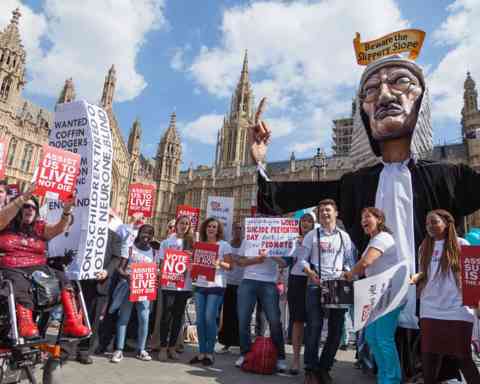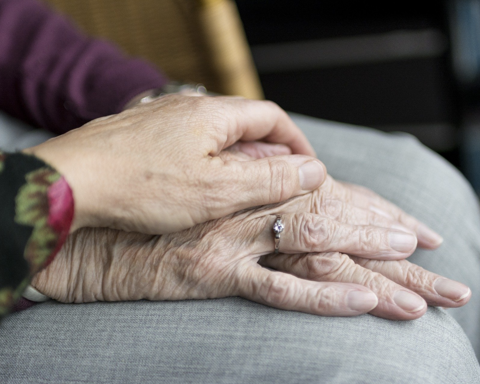Euthanasia and Assisted Suicide: Seven Reasons Why They Should Not Be Legalised (Dr Luke Gormally; 1997)
[A law permitting euthanasia, which was passed by the Legislative Assembly of the Northern Territory of Australia in 1995 (and which came into force in July 1996) was later overturned by a law passed by the Australian Federal Parliament. The ‘Andrews Bill’ had been passed by a large majority in the House of Representatives, but the result in the Senate remained uncertain up to the day of voting. In the event, it was passed by 38 to 33 votes. The Anscombe Centre (then the Linacre Centre) was gratified to learn that several Senators said they had been influenced to change their minds and oppose the legalisation of euthanasia by a talk given in 1995 by Prof. Luke Gormally at the John Plunkett Centre in Sydney, which the Centre subsequently published and distributed widely. The article below is an edited version of a Submission made by Prof. Gormally to the Senate Legal and Constitutional Legislation Committee, which reported on the issue of legalisation prior to the Senate vote.]
Euthanasia and Assisted Suicide: Seven Reasons Why They Should Not Be Legalised
1) The ‘justification’ of voluntary euthanasia involves rejection of a tenet fundamental to a just framework of laws in society
Voluntary euthanasia is the killing of a patient at his or her request in the belief that death would be a benefit to the patient and that the killing is for that reason justified. The mere fact that someone says, in an un-coerced fashion, that he or she wants to be killed does not in itself provide a doctor with a reason for thinking death would be a benefit to that patient. No doctor would accede to an apparently naked request to be killed, however seemingly un-coerced, if he thought the patient had prospects of a worthwhile life. A request to be killed appears to be a ground for euthanasiast killing only if the doctor believes that the patient does not have a worthwhile life.
Now, to say that the ongoing life of a person lacks value amounts to denying value or worth to that person, since the reality of a person is not something distinct from his or her ongoing life. What underpins euthanasiast killing are judgements on the overall worth of certain human lives.
It would be contrary to any legal system which purports to protect and enforce a just social order to legalise killing which rests for its justification on the belief that certain lives lack worth. Why? Because justice in society itself requires a non-arbitrary and non-discriminatory way of identifying who are the subjects of justice. But the only way of avoiding arbitrariness in identifying the subjects of justice is to assume that all human beings, simply in virtue of being human, are entitled to be treated justly and are the subjects of certain basic human rights. In other words the basic human dignity and worth which are recognised in respecting human rights must be seen as attaching to our humanity. Basic dignity and worth would not, however, be a title to just treatment if human beings were thought capable of losing them. They are, so to speak, ineliminable features of our humanity.
Euthanasiast killing, even when it is voluntary, involves denial of the ongoing worth of the lives of those reckoned to be candidates for euthanasia. It is a type of killing, therefore, which cannot be accommodated in a legal system for which belief in the worth and dignity of every human being is foundational.
It is of critical importance to every state to maintain a body of laws consistent with respect for the dignity and worth of every human being. In particular, it is important not to legalise killing of the innocent. For it is the fundamental task of civil authority to protect the innocent. But if the claim that a person lacks a worthwhile life is held to make killing lawful, then the state has ceased to recognise the innocent as having binding claims to protection. If the state treats these claims as null, then what claim has it to that authority which derives precisely from the need of citizens for protection from unjust attack?
2) To legalise assistance in suicide is also inconsistent with the same fundamental tenet of a just legal system
The decriminalisation of suicide (and attempted suicide, therefore) makes sense if we contemplate the plight of people having to face criminal proceedings after failed suicide attempts. Decriminalisation motivated by the desire to ease the plight of such people does not, however, imply that the law takes a neutral view of the choice to carry out suicide. Those who attempt suicide are clearly moved by the (at least transient) belief that their lives are no longer worthwhile. Since just legal arrangements rest on a belief in the ineliminable worth of every human life, the law must reject the reasonableness of a choice which is so motivated.
Hence the law must also refuse to accommodate the behaviour of those who effectively endorse the choice of the suicide: for they too are acting on the view that the person they are helping no longer has a worthwhile life. Their behaviour would not be sufficiently explained if one were to say that they were acting ‘out of friendship’ or ‘out of compassion’. For how could the motives of the person assisting in suicide be described as ‘friendship’ or ‘compassion’ if they were not informed by the thought that the person intending to kill himself would be better off dead? If one thought this person could continue to have a worthwhile life it would hardly be an act of friendship, for example, to help him kill himself.
So there is reason to resist the legalisation of assisted suicide as fundamental as the first reason given for resisting the legalisation of euthanasia.
3) If voluntary euthanasia is legalised then the most compelling reason for opposing the legalisation of non-voluntary euthanasia has been abandoned
Many of those who support the legalisation of voluntary euthanasia are opposed to the legalisation of non-voluntary euthanasia. But if we cannot make sense of the claim that euthanasia is a benefit to the person to be killed without relying on the thought that that person no longer has a worthwhile life, then supporters of voluntary euthanasia are buying into a larger package-deal than they perhaps realise. For if one can be benefited by being killed, is it reasonable to deprive people of that benefit simply because they are incapable of asking to be killed? And if we are puzzled (rightly) by the claim that someone might be benefited by having his life ended, we might nonetheless accept the claim that a person cannot be harmed by having his worthless life ended.
In fact the most active and clear-sighted advocates of the legalisation of voluntary euthanasia are also advocates of the legalisation of non-voluntary euthanasia. They promote the view that many human beings lack the ‘moral standing’ (what is here called ‘basic dignity’) in virtue of which they enjoy basic human rights; so they cannot be wronged even if the motive for killing them is merely the convenience of those human beings who do have ‘moral standing’. The whole exercise of drawing a line between human beings who do and those who do not possess ‘moral standing’ is utterly arbitrary. Advocates of the legalisation of euthanasia, such as the philosophers Peter Singer and Helga Kuhse, who embrace such arbitrariness, do so without any evident concern for the subversion of the foundations of justice which the arbitrariness entails.
4) Legalisation of voluntary euthanasia would also encourage the practice of non-voluntary euthanasia without benefit of legalisation
This would happen in two ways:
Firstly, it has proved to be the case that those who begin by saying they wish to confine the practice of euthanasia to voluntary euthanasia come to think that, if that is allowed, no good reason remains for disallowing non-voluntary euthanasia, so they begin to plan for the systematic practice of non-voluntary euthanasia. This phenomenon can be seen, for example, in the behaviour of The Royal Dutch Medical Association over the past fifteen years. Having worked for the acceptance of what purported to be the 'strictly controlled' practice of voluntary euthanasia only, they are now working for the acceptance of the practice of non-voluntary euthanasia.
Secondly, because the criteria for delimiting the practice of euthanasia to killing at the request of the patient prove to be irremediably imprecise. The Dutch experience has demonstrated the truth of what critics said about any legal accommodation of voluntary euthanasia (whether by statute law or by judicial decision), namely, that it would lead to the extensive practice of non-voluntary euthanasia. The available data show, on a conservative estimate, that about 1 in 12 deaths in Holland in 1990 were euthanasia deaths (10,558 cases) and more than half of these were without explicit request.
5) Euthanasia undermines the dispositions we require in doctors and is therefore destructive of the practice of medicine
The practice of medicine cannot flourish unless doctors are so disposed that they inspire trust in patients many of whom are extremely vulnerable. Doctors will not inspire trust unless patients are confident that doctors:
- are for no reasons disposed to kill them;
- have no inclination to ask whether a patient is worth caring for or treating, rather than asking what care or treatment might benefit the patient.
But the practice of euthanasia systematically undermines both of the required dispositions. For it disposes doctors to kill certain of their patients, and it inculcates a disposition to think of some patients as not having worthwhile lives. Since there are no non-arbitrary criteria for determining who has and who has not a worthwhile life, the temptation to categorise the difficult and the unappealing as not having worthwhile lives is very strong for the person who has failed to eschew such discriminatory thinking as a matter of principle.
It is an important part of the duty of the state to maintain a framework of law which is conducive to an essential profession such as medicine functioning well in the interests of citizens. The state would fail in that duty were the law to permit behaviour on the part of doctors which was corrosive of the doctor-patient relationship.
6) The legalisation of euthanasia undermines the impetus to develop truly compassionate approaches to the care of the suffering and the dying
The proper expression of compassion is care motivated by a more or less strong sense of sympathy with the affliction of the person suffering. But one cannot care for people by killing them.
It is very important to bear in mind that a key element in the context of contemporary debates about legalising euthanasia is the drive to reduce health care costs. One of the conspicuous dangers of legalisation is that, before long, euthanasia would be seen as a convenient 'solution' to the heavy demands on care made by certain types of patient. Medicine would thereby be robbed of the incentive to find genuinely compassionate solutions to the difficulties presented by such patients. The kind of humane impulses which have sustained the development of hospice medicine and care would be undermined because too many would think euthanasia a cheaper and less personally demanding solution.
7) Three Committees established by English-speaking legislatures to consider proposals to legalise euthanasia have recommended that it not be legalised
1994-95 saw the publication of Reports of Committees established by the House of Lords of the UK Parliament, by the New York State Task Force on Life and the Law, and by the Senate of the Canadian Parliament. All these Committees were composed of people with different views on the intrinsic morality of euthanasia, yet they were clear in opposing its legalisation. For example, the House of Lords’ Select Committee had among its members many who were on record as advocates of euthanasia. And yet after a year of hearing and reading an extensive body of evidence and debating the issues among themselves, they decided unanimously to recommend that euthanasia should not be legalised.
There is much in all three Reports that is worthy of the attention of the Legal and Constitutional Legislation Committee of the Senate of the Australian Federal Parliament. Let the following quotation from the House of Lords’ Select Committee Report stand as the epitome of the collective wisdom of these Committees:
‘(S)ociety’s prohibition of intentional killing... is the cornerstone of law and social relationships. It protects each of us impartially, embodying the belief that all are equal. We do not wish that protection to be diminished and we therefore recommend that there should be no change in the law to permit euthanasia... The death of a person affects the lives of others, often in ways and to an extent which cannot be foreseen. We believe that the issue of euthanasia is one in which the interest of the individual cannot be separated from the interest of society as a whole’.
It is the hope of the present writer that the members of the Legal and Constitutional Legislation Committee will, after due consideration, associate themselves with the moral and political wisdom exhibited in this statement.
Most recent
Euthanasia & Assisted Suicide: Writing or Speaking to your Elected Representative
25 October 2024
A Guide on how to write to write to your MP (if resident in the UK, Deputy (if in Ireland), or MSP (...
Eight Reasons Why We Must Not Legalise ‘Assisted Dying’
25 October 2024
A short summary of some key arguments against legalising assisted suicide.
Anscombe Centre Briefing – Consultation on Assisted Suicide in Scotland
17 July 2024
Our Guide to the 07 June 2024 to 16 August 2024 Scottish Consultation on the Assisted Dying for Term...
Support Us
The Anscombe Bioethics Centre is supported by the Catholic Church in England and Wales, Scotland, and Ireland, but has also always relied on donations from generous individuals, friends and benefactors.



